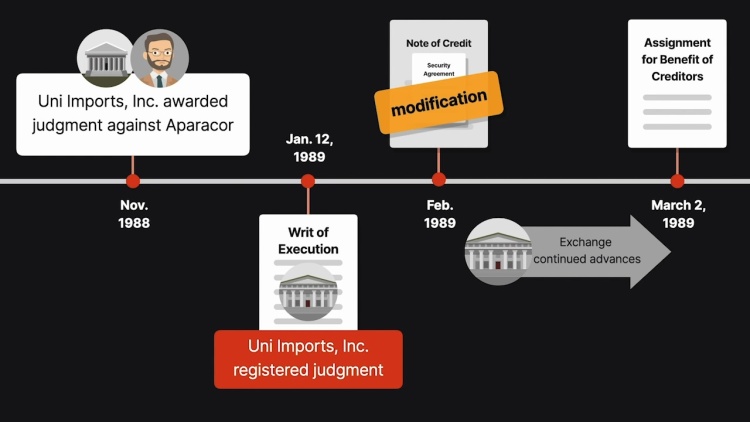Uni Imports, Inc. v. Exchange National Bank of Chicago
United States Court of Appeals for the Seventh Circuit
978 F.2d 984 (7th Cir. 1991)
- Written by Samantha Arena, JD
Facts
In 1987, Aparacor, Inc. (Aparacor) (defendant) granted a security interest to Exchange National Bank (Exchange) (defendant) in Aparacor’s assets that were in Exchange’s possession. The following year, Exchange established a revolving line of credit in Aparacor’s favor by executing a note that incorporated the original security agreement between the parties. Upon the expiration of the note, Exchange continued to make additional advances to Aparacor. In November 1988, Uni Imports, Inc. (UNI) (plaintiff) won a $66,000 money judgment against Aparacor in district court. UNI registered the judgment and delivered a writ of execution to Exchange in an attempt to levy upon Aparacor’s assets. Exchange refused to surrender the assets, arguing that Exchange’s interest in the assets took priority over UNI’s interest. Thereafter, Exchange continued to advance funds to Aparacor. Between March and May of 1989, Exchange also made additional payments totaling approximately $2.8 million in connection with the line-of-credit advances, including for interest, taxes, and legal fees. After Aparacor’s outstanding balance was credited for collections from the accounts receivable, Aparacor continued to owe Exchange approximately $1 million. UNI petitioned the district court for a turnover of Aparacor’s assets in Exchange’s possession. The district court granted the petition, and Exchange appealed.
Rule of Law
Issue
Holding and Reasoning (Crabb, C.J.)
What to do next…
Here's why 907,000 law students have relied on our case briefs:
- Written by law professors and practitioners, not other law students. 47,100 briefs, keyed to 996 casebooks. Top-notch customer support.
- The right amount of information, includes the facts, issues, rule of law, holding and reasoning, and any concurrences and dissents.
- Access in your classes, works on your mobile and tablet. Massive library of related video lessons and high quality multiple-choice questions.
- Easy to use, uniform format for every case brief. Written in plain English, not in legalese. Our briefs summarize and simplify; they don’t just repeat the court’s language.





